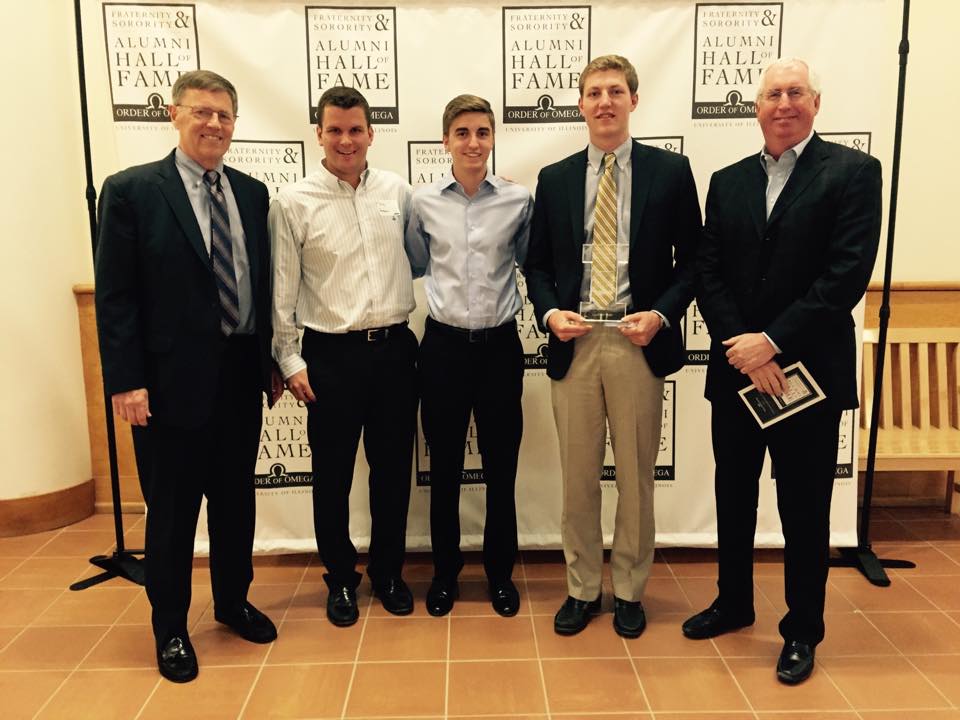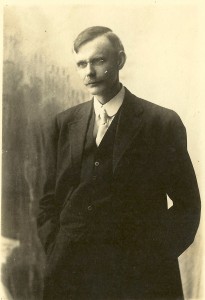Last Saturday, Thomas Arkle Clark 1890 was inducted into the University of Illinois Fraternity and Sorority Hall of Fame along with four other distinguished greek alumni including, Roberta Shields of Alpha Kappa Alpha Sorority, Peg Crawford of Alpha Omicron Pi Sorority, Bob Dudley of Phi Kappa Psi Fraternity and Burton Baskin of Zeta Beta Tau Fraternity.
Jack Klues ’77, Dane Luhrsen ’77, Mitchell Talbot ’17, Billy Hanson ’16 and Thomas Wolfe ’16 accepted on behalf of Gamma Zeta ATO.
The University of Illinois Fraternity and Sorority Hall of Fame is in it’s second year and is overseen by the Order of Omega leadership honor society for members of Fraternity & Sorority organizations.
It was a nicely done ceremony and included very worthy inductees. Hopefully, many more Gamma Zetas will join Thomas Arkle Clark in the years to come.
Here’s some information about Thomas Arkle Clark that we submitted on his nomination form.
University of Illinois Greek Hall of Fame Thomas Arkle Clark Nomination
Please provide a narrative detail of this alumni’s outstanding professional accomplishments.
- In 1893, Clark was offered a position as an assistant professor of rhetoric at the University of Illinois. Two years later he was named an Associate Professor. Clark was promoted to full professor and head of the rhetoric department in 1899.
- Clark was named Acting Dean of the College of Literature in 1900. The next year, he was named Dean of Undergraduates and Secretary to the President. This made Clark a member of the school’s Council of Administration. His Dean of Undergraduates title was soon changed to Dean of Men. This made Clark the first to ever hold this title.
- Clark supported fraternities and under his direction, Illinois grew to have one of the largest fraternity and sorority systems in the nation. He also established a Student Publications Board to oversee campus publications. Clark dismissed students caught hazing and established a program personally welcoming freshmen.
- In 1911, he began a program issuing a handbook to freshmen concerning rules, regulations, and advice. By the time of his retirement in August 1931, Clark had greatly expanded the role of Dean of Men, overseeing the Dean of Foreign Students, Assistant Dean of Men, Dean for Freshmen, and Adviser to Student Activities.
Please list and describe this alumni’s involvement with the community through professional or charitable organizations.
- Clark co-founded the National Association of Student Personnel Administrators in 1919.
- In 1923, he founded the Phi Eta Sigma honors society and served multiple terms as its president.
- He served on the building committee for the McKinley Foundation Church.
- Dean Clark served for many years as the scholastic adviser of the National Interfraternity council.
- Dean Clark served as president of the Urbana Rotary Club
- In 1918 Dean Clark served as Military Adjutant for the University of Illinois during WWI
Honors/Awards
- The Alpha Tau Omega National Fraternity annually presents the Thomas Arkle Clark Award to its top undergraduate member.
- The ATO Chapter House is named the Thomas Arkle Clark Memorial Chapter House.
- Clark Hall on Gregory is named after Thomas Arkle Clark.
- There is a Dean Clark room at the McKinley Foundation near campus.
- Dean Clark’s portrait hangs in the Pine Lounge in the Illini Union.
Any additional information
- Thomas Arkle Clark was Worthy Grand Chief (National President) of Alpha Tau Omega from 1918 to 1923, then again from 1929 to 1931.
- He was initiate #1 and founder of the Alpha Tau Omega Gamma Zeta Chapter at the University of Illinois.
- Thomas Arkle Clark personally signed the mortgage note and his guarantee allowed the current chapter house to be built at 1101 W. Pennsylvania Avenue to be built in 1931.
- In the book “Deans of Men and the Shaping of Modern College Culture” By Robert Schwartz there is an entire chapter devoted to Thomas Arkle Clark titled “The Pioneer, Thomas Arkle Clark, Dean of Deans”. Clark was credited with supporting the growth of fraternities at the University of Illinois from the era where they were outright banned in the late 1800’s to in 1930 when the University had 92 chapters.
- Dean Clark was president of the University of Illinois Alumni association in 1893-94 and was one of the founders of the Alumni Quarterly, which became the Alumni News. The first alumni office at the University was a desk in the outer office of Dean Clark.
Dean Clark was a prolific author of more than 1400 essays. Among his many publications included are:
- “The Fraternity and the College: Being a Series of Papers Dealing With Fraternity Problems”
- “Discipline and the derelict”
- “Facts for freshmen concerning the University of Illinois”
- “The high school boy and his problems”
- “The Sunday eight o’clock, brief sermons for the undergraduate”
As an undergrad, Thomas Arkle Clark was:
- Editor in Chief of the Illini (later the Daily Illini)
- Junior and Senior class Orator
- Editor of the Sophograph (later the Illio)
- Class Poet
- Alpha Tau Omega Fraternity
- Phi Beta Kappa
- Philomathean Literary Society
- Shield and Trident
We also submitted this pdf of the Daily Illini which includes Thomas Arkle Clark’s obituary and other tributes from shortly after he passed away in 1932.
039-DIL-1932-07-19-001-SINGLE (1)
One of the articles claims that Dean Clark saw an average of 354 students per day during his last months in his job as Dean of Men. The following are a couple of stories found in the U of I Archives which describe how Dean Clark dealt with a couple of disciplinary situations. Each was likely a meeting less than one minute long. However it’s easy to see how each of these were life changing meetings and the vast impact that Dean Clark had on so many people when you consider how many of these that he did.
This was told in 2001 by William O’Dell ’31 (not an ATO)
… Oh I remember the one that made me a 1931 graduate instead of a 1930 graduate. When I got kicked out of school. There was a University no car rule at the University at that time and undergraduates could not drive cars unless they were employed. I got my parents permission to take the family car from LaGrange down to Champaign for a big Spring weekend, dance weekend. So I had this car in violation of their no car rule. And this made travel with my girlfriend from one fraternity to another easier, and go to many different fraternity parties during on weekend. I was driving down Green Street with 3 or 4 people, en route to Chicago, or LaGrange, to return my car and then took the train back to Champaign on Monday.
There was a note in my mailbox from Dean Thomas Arkle Clark asking me to come into his office at 11:30 the next morning. This would strike terror into anyone’s heart. And so I showed up and my interview with him was probably 40 seconds long, and the message was that I was being expelled from the University for the balance of the semester for violating the no car rule. He named the people in the car, what direction I was going down Green Street.
The rumor, of course, around the campus was that Thomas Arkle Clark had a spy ring, and that had never been documented, but I don’t know that it had ever been completely denied either. In any event, Thomas Arkle Clark was a feared dean. I had tremendous respect for him, but that was the rule and regulation that I do remember.
And my father, I will give him credit when I told him what had happened. I had lied to my parents really. I told them that there would be no problem, that this was just for a weekend. He never berated me in anyway, but he did say, “Despite your actions, I will give you a graduation present, and that will be another semester in school so you can get your degree, because it is essential if you want to be a success that you get that degree.” I remember clearly, he said, “Bill, you go back to school.” No I didn’t want to go back. I said, “Dad I don’t need a degree. I am a college man now. I don’t need anything more.” And he said to me, “You go back and get that degree or you will regret it the rest of your life because you will always have to explain why you didn’t complete your schooling!” So I did go back for the following semester. Of course, in retrospect it was great advice, but he never turned me over his knee and thrashed me or anything [laughter].
ES: He didn’t question Thomas Arkle Clark doing this? WO: Well he did. He talked to Adolph Mueller, then Chairman of the Board of Mueller Company in Decatur. And I believe he was a member of the Board of Trustees at the University at that time. In any event it was Adolph Mueller who went back and talked to Thomas Arkle Clark. The response that Thomas Arkle Clark gave Adolph was, “he was lucky it wasn’t more severe.” So that was the end of that.
This second story was also told in 2001 and concerns Red Grange (likely just before he had his famous game against Michigan dedicating Memorial Stadium).
There was another football player named Swede, and Swede was a great friend of Red Grange, and he had a car. Forbidden, but he had a car. And so this particular night they had gone down to the Orpheum Theater that had Vaudeville shows and they had a gallon of Prohibition whiskey in the car. When they went into the performance the manager saw him and said, “Oh say, we sure got a good troup here this time and they’re staying over at the hotel.” There was a hotel right across the street at the time, from the Orphium. “They’re staying over there after the performance, we’re going to have a little party.”
So, they did and they went out to the car and they got this whiskey out of the car and they went over to the party.
Now, this was on a Saturday night. Dean Clark had a spy system, he had a kid in every fraternity and in every rooming house who reported to him any unusual things. So Monday morning Mr. Grange was called into Dean Clark’s office. He said, “Mr. Grange, I understand that on Friday night you and Sweed went down to the Orpheum Theater and attended a performance there and afterwards you went out to the car and got this gallon of whiskey and you took it over to the hotel across the street and you participated in this party. Is that correct Mr. Grange?” He said, “No, Friday night I was in Danville, I can prove it.” Dean Clark said, “Mr. Grange, if you say so, that’s fine.” He said, “it took me a good many years to realize that he had changed the night.” He knew. The reporters said, “Can we print that story?” And he said, “no.””

